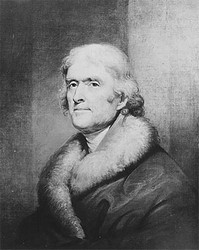Thomas Jefferson On Banks
|
| updated |
Copy Link Code
|
 The publicly expressed opinions of Thomas Jefferson on banks and bankers were almost always critical and antagonistic. One famous Thomas Jefferson quote on banks claims that they were "more dangerous than standing armies." In the opinion of Thomas Jefferson, debt was a burden that could endanger the sovereignty of any young nation. The opinion of Thomas Jefferson on corporations was not much different as he feared any conglomeration of wealth would lead to an aristocracy of merchants. For the Virginia planter Thomas Jefferson, banking was the business of an urban class that shared few of his ideals besides independence from Britain. Even the opinion of Thomas Jefferson on money shows his prediction that financial institutions would come to manipulate and potentially overthrow the democratically elected government. Another one of the famous Thomas Jefferson quotes on banking labels the Bank of the United States as the greatest threat to American democracy.
The publicly expressed opinions of Thomas Jefferson on banks and bankers were almost always critical and antagonistic. One famous Thomas Jefferson quote on banks claims that they were "more dangerous than standing armies." In the opinion of Thomas Jefferson, debt was a burden that could endanger the sovereignty of any young nation. The opinion of Thomas Jefferson on corporations was not much different as he feared any conglomeration of wealth would lead to an aristocracy of merchants. For the Virginia planter Thomas Jefferson, banking was the business of an urban class that shared few of his ideals besides independence from Britain. Even the opinion of Thomas Jefferson on money shows his prediction that financial institutions would come to manipulate and potentially overthrow the democratically elected government. Another one of the famous Thomas Jefferson quotes on banking labels the Bank of the United States as the greatest threat to American democracy.
In the personal life of Thomas Jefferson, money was not a given and he faced a long list of debt in the inheritance of his father-in-law's estate. As he perceived his own virtuousness for paying down the family debt with "working" the land of his slave plantation, Jefferson envisioned the perfect society for democracy as one based on agrarian ideals and hard work over convenient financing. Although Jefferson's opposition to the Federalists was popular throughout the countryside, many farmers felt that the banks were necessary in fostering growth and expansion as more arable land became available to the West. As the first Secretary of State under the Washington administration, the contentious Jefferson quarreled with Cabinet members from the Federalist factions. One of the biggest policies opposed by Thomas Jefferson, national bank plans crafted by the Treasurer, Alexander Hamilton, and supported by President Washington pushed Jefferson to form an anti-administration party and resign his post as Secretary of State. George Washington would never forgive him for this public display of dissent.
In the perspective of Thomas Jefferson, central bank policies could only draw power away from the people and into an unaccountable institution. Another enemy of Thomas Jefferson, corporations were already gaining influence over politics and Jefferson feared that this momentum might lead to a complete loss of the farm as the economic engine of America. In the principles of Thomas Jefferson, jobs that held dignity were those that produced something tangible unlike the profits of a banker who has only shifted other people's money to his advantage. One might imagine that for Thomas Jefferson, Federal Reserve policies and the existence of such an institution would be a nightmare of democratic apocalypse. Regardless of all his idyllic, agrarian principles, Jefferson's economic theory could be no more moral than any financial institution while he was invested so heavily in slave labor. In many of Jefferson's actions, we can see a man acting for his own gain even while espousing theories of liberty and equality. Although he would support the concept of abolition numerous times, Jefferson would always demand mass deportation as an immediate requirement. Fortunately, he failed.
